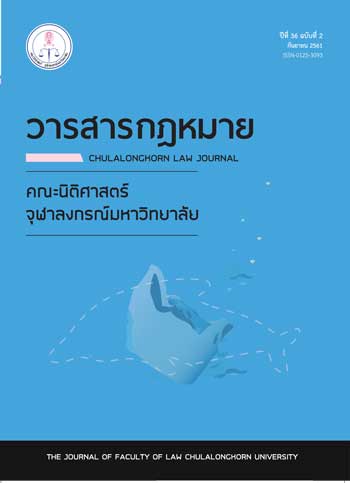King Rama VI’S Legal Concept in Enacting the Palace Law of Succession, B.E.2467 (1924)
Main Article Content
Abstract
According to historical evidence in Thai legal history, there were not any clear provisions relating to the rule of succession to the throne until the reign of King Vajiravudh (reigned B.E. 2453-2468 (1910 –1925)) In the late period of the reign, King Vajiravudh promulgated the Palace Law of Succession 2467 B.E. (1924) which is the first written Thai palace law of succession. Pursuant to the research, the law was influenced by the European law of succession to the throne using the analogy with the Royal British tradition as a result of His Majesty’s education in England during the status of the crown prince. However, he chose the rules which is in accordance with Royal Thai tradition and fulfill the loophole of it that would possibly cause the negative impact on the throne. Furthermore, he altered the Western provisions in accordance with Thai society and chose not to include those inconsistent with the Thai tradition as there would not be a perfect blend between the western and the Thai tradition. His Majesty’s idea on creating new provisions of law without leaving out the old tradition has made the B.E.2467 (1924) Palace Law of Succession a perfect law through every succession with no rises of riots or insurgencies. The B.E.2467 (1924) Palace Law of Succession has been regarded an effective legislation that could permanently resolve previous succession controversies in Thai history. His Majesty’s legal policy is worth to be considered the main guide for the legal drafting and the legislation in the present time.
Article Details
The copyright in this website and the material on this website (including without limitation the text, computer code, artwork, photographs, images, music, audio material, video material and audio-visual material on this website) is owned by Chulalongkorn University Law Journal and its licensors.
1. Chulalongkorn University Law Journal grants to you a worldwide non-exclusive royalty-free revocable license to:
- view this website and the material on this website on a computer or mobile device via a web browser;
- copy and store this website and the material on this website in your web browser cache memory; and
- print pages from this website for your use.
- All articles published by Chulalongkorn University Law Journal are licensed under the Creative Commons Attribution 4.0 International License. This permits anyone to copy, redistribute, remix, transmit and adapt the work provided the original work and source is appropriately cited.
2. Chulalongkorn University Law Journal does not grant you any other rights in relation to this website or the material on this website. In other words, all other rights are reserved. For the avoidance of doubt, you must not adapt, edit, change, transform, publish, republish, distribute, redistribute, broadcast, rebroadcast or show or play in public this website or the material on this website (in any form or media) without appropriately and conspicuously citing the original work and source or Chulalongkorn University Law Journal prior written permission.
3. You may request permission to use the copyright materials on this website by writing to journal@law.chula.ac.th.
4. Chulalongkorn University Law Journal takes the protection of its copyright very seriously. If Chulalongkorn University Law Journal discovers that you have used its copyright materials in contravention of the license above, Chulalongkorn University Law Journal may bring legal proceedings against you seeking monetary damages and an injunction to stop you using those materials. You could also be ordered to pay legal costs.
If you become aware of any use of Chulalongkorn University Law Journal's copyright materials that contravenes or may contravene the license above or any material on the website that you believe infringes your or any other person's copyright, please report this by email to journal@law.chula.ac.th.


